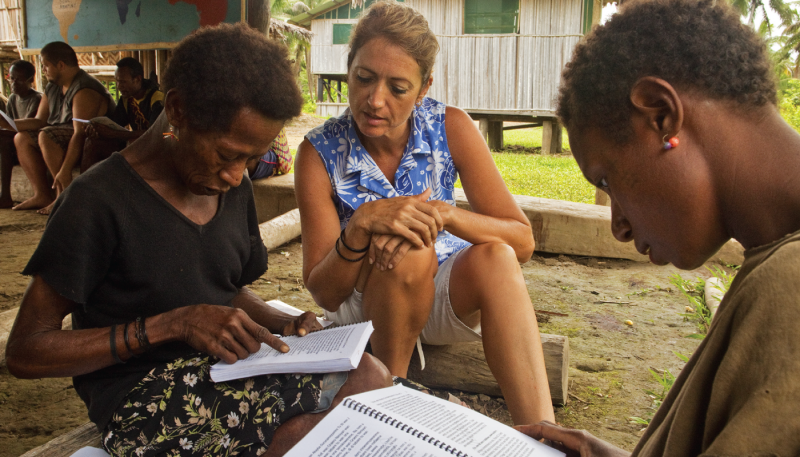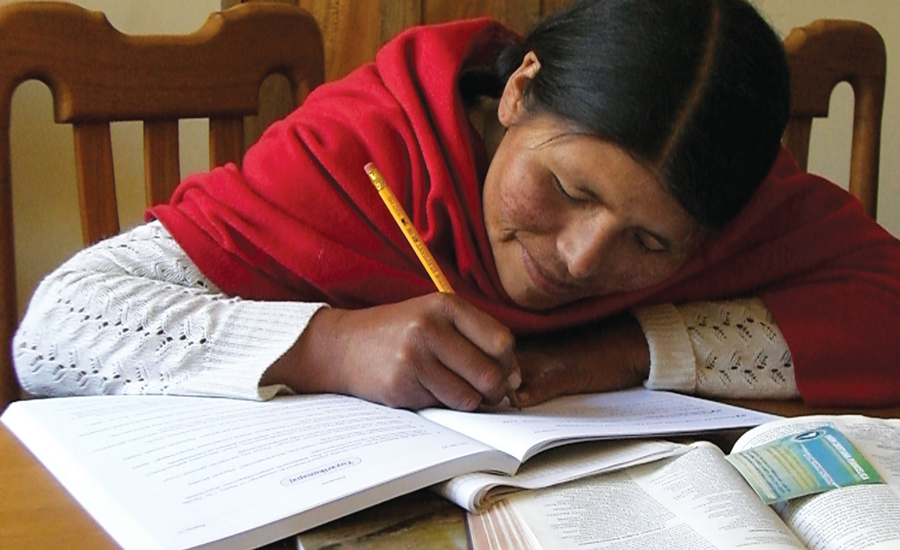Heart Language Ministries part 2

This year our focus is on heart language ministries. Culture and language acquisition [CLA] (learning another language with its culture) and literacy (teaching others to read and write in their often previously unwritten language) have been the foundation for heart language ministries. If you wish to know more about CLA and literacy’s impact on those ministries, you can find more information at go.ethnos360.org/heartlanguage
Before we go on, let me share something written by Regina Kowert that intrigued me. She has been ministering in West Africa for a number of years, faithfully working on CLA. Keep in mind that Regina’s heart language is not English but German.
I had told some Senegalese that in Germany we only speak one language. They found it hard to believe that. Over here there are so many different ethnic groups and languages. My friends speak Sérè. When they visit me and someone else from a different group is with them, they speak Wolof. My language helper speaks Jola-Fonyi, and the guard speaks Pulaar. These are only four of 39 languages in Senegal. Do not be fooled by the thought that many speak and understand French. Only about 10% are true French speakers and 21% speak partly French (according to Organisation Internationale de la Francophonie, 2005).
For many here it is a real challenge to understand the French Bible. Sabrina* learned French in school but does not use it in everyday life. Her sister Maria* went to the Arabic school; she did not learn to read French, but she is able to communicate a little. Cristina [has been] a Christian for many years now and reads the French Bible. Very slowly and staggering. Can these three speak French? [Some might say ‘yes.’] Do they understand the French Bible? That is a tough question to answer! But in their own language they are not able to read, nor is there anything written. Will they ever be able to say “God speaks my language?”
I always thought my friend Cristina was praying in French because of me. A while ago we visited her family, and everyone was speaking in Sérè, but she changed to French to pray. That is when it hit me. I asked her,” Why do you not pray in Sérè?” She replied, “I do not know how to pray in my language.” Will she ever be able to say “God speaks my language”? She does not speak to God in her mother tongue because God has never spoken to her in her language. Please pray for Bible translators in the many parts of the world.
On a positive note, Regina was able to help Cristina learn how to pray in Sérè, but can you imagine not knowing how to speak to the Creator God from your heart? Let’s take a look at how Bible translators function in heart language ministries. How do they feel about putting the Word of God into someone’s heart language?
Bible Translators and Consultants
The language has been learned along with the culture; there are fluent readers in the village; now we need to have the Word of God ready for them to read. That is where the Bible translators come in.
It takes many years from the time a translation is started until the New Testament is completed. In order to understand the driving passion of translators, I asked some of the translators and translation consultants who are working on translation projects about the importance of heart language ministries.
Bob Clark, translator with the Tugutil people of Asia-Pacific and translation consultant, said, “Ministering and teaching in a person’s heart language is crucial to their understanding of the message [of the gospel]. A few decades ago many missionaries assumed that if people could understand a ‘second language,’ it would be easier and quicker to teach them in that language rather than investing the time and energy into learning their heart language.

“Over time it became clear that in most cases our audience didn’t understand that second language as well as we had hoped, and therefore our communication of the gospel and all the other important truths of Scripture were not being understood clearly. As a result, many missionary teams eventually switched approaches and began teaching in and translating into the heart language of the people to whom they were ministering, with clear understanding and real spiritual growth following not far behind.
“A message as important as the contents of Scripture needs to have the best chance of being understood, and we are convinced that means translating into the heart language of our audience.”
Kirk Rogers has ministered among the Landuma people of Guinea and is translating the New Testament. He said, “Heart language ministry, communicating God’s Word in the heart language of each person, is critical to their receiving the truth with maximum clarity, understanding and impact.
“In [the book of] Esther, we see that important messages were sent out by King Ahasuerus, Haman and Mordecai to every province in the empire, having been translated into the local language of each of the 127 provinces (emphasis added), written in their own script or alphabet. These were messages considered to be important by the senders — so important that they went to the trouble of making sure the recipients would be able to understand them clearly. How much more should we be concerned to make clear the message of God’s Word in each person’s heart language so that everyone can have an opportunity to know God and to worship Him in spirit and in truth?”
As both a translator and a translation consultant, Lisa Kappeler ministers among the Uriay people of Papua New Guinea. Her words are clear and pointed: “I work in a language group where the majority of the women don’t speak the national language. Some of the men can get by in daily conversation in the national language, but when it comes to worldview issues, especially in the spiritual realm, they lose track of the meaning and don’t understand what they’re hearing. They might be able to parrot some of it back, but they wouldn’t be able to define or restate it to someone else later on. There were men and women in the village that I couldn’t really communicate with until I spoke their heart language (emphasis by author). So our situation is that, unless we worked in the heart language of the people, they wouldn’t understand the Word of God or the gospel.”
Lisa continued, “What are you going to teach from if there’s no Bible in that heart language? If you believe in a heart language ministry, then you’d need a heart language Bible to teach from. And you want them feeding themselves from God’s Word, so they need to be able to read it in their language. It’s vital to the church planting effort and to the growth and maturity of the church.”
“We believe that the Bible should be accurate, clear and natural. As a consultant, we check for all three things as an extra set of eyes on the translation project. And since consultants have translated [the Scriptures] themselves, they know what to look for in areas of comprehension that a new translator wouldn’t consider. So I’m helping their translation into the heart language communicate effectively in that heart language.”

There is no way to exaggerate the importance of heart language ministries. Allowing Cristina to hear God speak in her own language is a gift beyond compare. To teach, to read the Scripture and to counsel new believers in their own language with all its subtleties and nuances diminishes syncretism and misunderstanding.
Thank you for your part in supporting heart language ministries. Your gifts have blessed so many people by enabling them to succeed in heart language ministries around the world.
(*Names changed)
